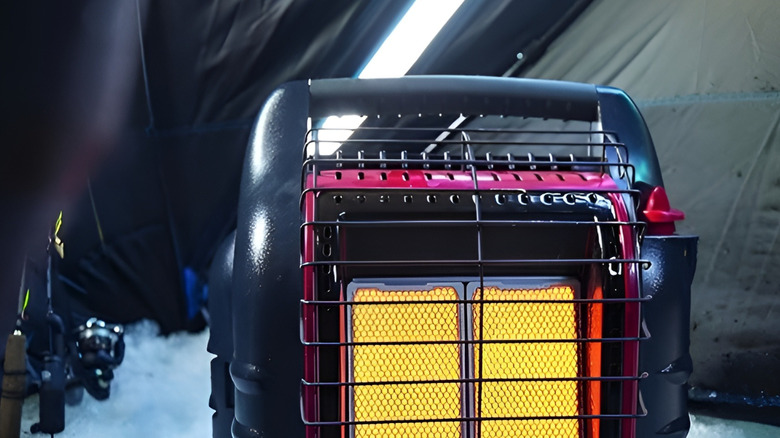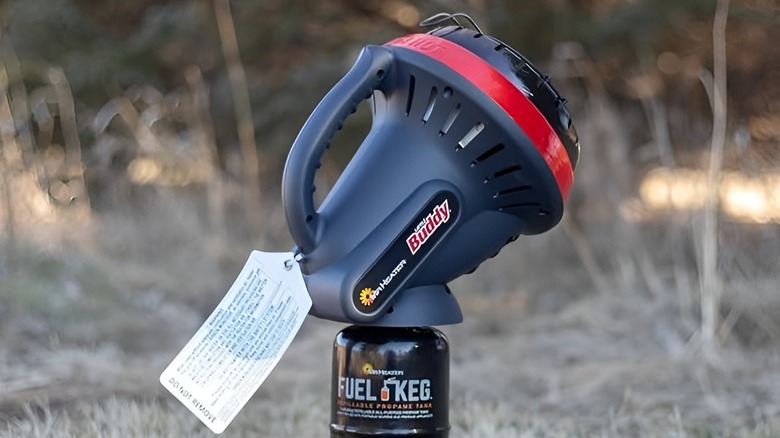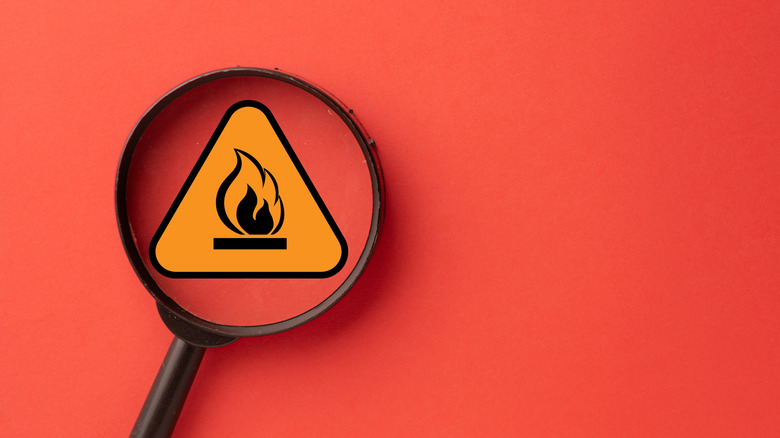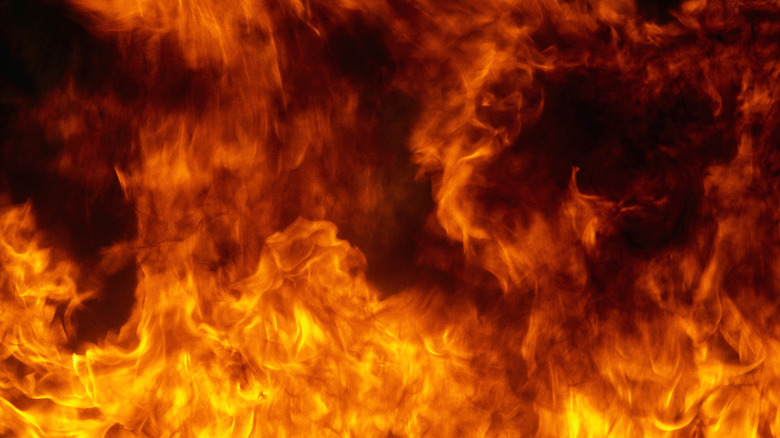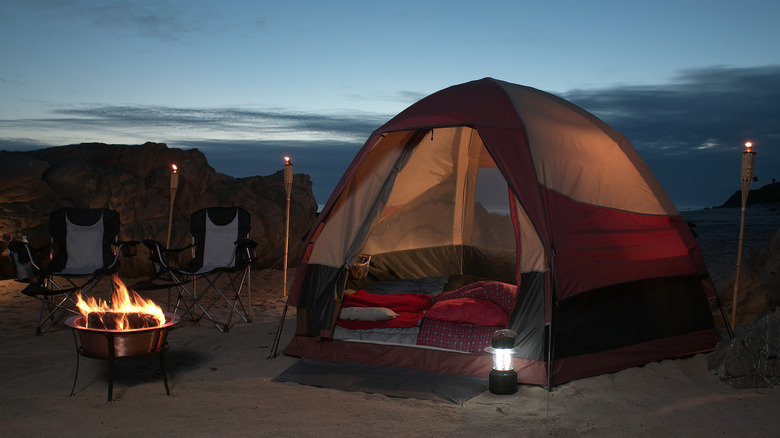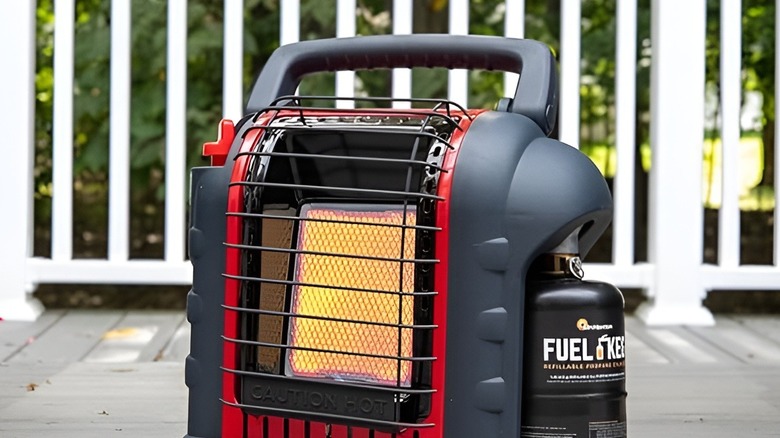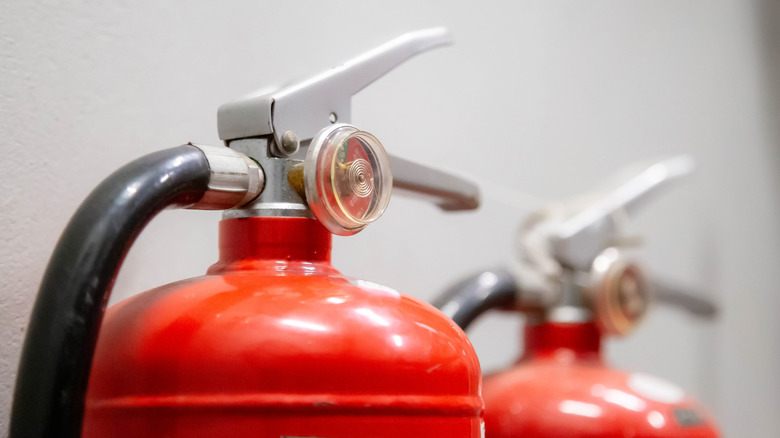7 Tips For Using A Heater In Your Tent While Camping
We may receive a commission on purchases made from links.
Part of the appeal to camping for many is the raw, rewarding experience of surviving in the wilderness. Some may even prefer camping during the colder times of the year as a way of giving themselves an extra challenge. Among the many variables that come with the outdoors, there's the added challenge of enduring the freezing cold. Sure, you could always go back to mankind's very beginnings and warm yourself with a roaring fire, but you could also take advantage of one of our modern mechanical marvels, the tent heater.
Even though there are plenty of ways to stay toasty during your winter expedition, few methods pack the same kind of power that a tent heater can provide. On top of producing high levels of BTU that can heat hundreds of square feet, such as Mr. Heater Big Buddy Portable Propane Heater , these tools are easy to transport, durable, and varied. From propane to electric to catalytic, there are a wide assortment of heaters to choose from depending on your specific needs. But no matter what kind of heater you choose, it's important to use them safely.
As with any kind of machinery that can generate power like a tent heater and in an enclosed space, there's always the potential for dangers such as carbon monoxide or fires. Most tent heaters are specifically designed to steer clear of such problems, but it doesn't hurt to take some extra precautions to keep yourself and those around you safe from harm.
Buy a heater with safety functions
Getting the right kind of tent heater is the first step to staying safe with one of these tools. First off, be sure you're getting heater specifically made for use in interior spaces such as tents. Outdoor heaters typically produce higher quantities of heat, which can quickly become uncomfortable and far more dangerous. Take stock of the size of your tent and find an heater approved for enclosed environments of that size.
Even beyond this, there are a number of features and functions you should keep an eye out for that can further lessen the chances for disaster. Many heaters nowadays come with built-in safety functions that detect potential hazards and shut down the tool before any worse danger can occur. Some such as the Mr. Heater Little Buddy Propane Heater comes with a fall detector that automatically senses when the device is tipped over, stopping it from breaking and starting a fire. Other heaters are even able to shut down after identifying overheating or excessive carbon monoxide.It might not even be a bad idea to bring supplementary tools along, such as carbon monoxide detectors or thermometers, as supplementary items on your trip.
Keep your tent clean and free of flammable objects
No matter how many safety features your heater has, you should still do everything in your power to make sure there's never a reason for those functions to kick in. The area where your heater will be located should be your top priority, as there could be more dangers laying around your tent than you may initially realize.
A number of items you'll find in and around your tent, such as leaves, clothing, sleeping bags, paper, and carpeting can start fires in the wrong situation. Even dusts such as those from charcoal and cotton can be hazardous when exposed to an ignition source.To prevent a potential fire, you should keep your tent as clean as possible. You can sweep with a broom and pan, although there's no shortage of powerful cordless vacuums with long-lasting batteries, many even being handheld.
You should also be cautious with where your heater is placed to ensure it doesn't come into close contact with any potentially flammable items. A good rule of thumb is to keep the heater no less than three feet away from anything that could catch fire. Avoid overstuffing your tent with belongings to make it easier to give your heater some space.
Never leave the heater unsupervised
As tempting as it is to keep your heater on all night, it may not be such a smart idea. All it takes is one unnoticed mishap for your camping trip to turn into a barbecue, so it's important that you don't leave your tent heater unattended.
Plenty can go wrong with your heater while not paying attention to it. A gust of wind can knock it over, an internal mechanism can go awry, or someone can accidentally get hurt from touching the tool, among many other undesirable occurrences. As a result, you should always keep an eye on the heater whenever it's on to ensure you spot any potential issues before they become problems. It's also a good idea to keep children and pets away from the heater out of an abundance of caution.
If you're concerned about staying warm while you sleep, then leave the heater on for some time before going to bed to ensure your tent is toasty and then turn it off. Additionally, having a heater with built-in timers or detection features can also aid in preventing problems while giving you a bit more leeway.
Keep your tent well-ventilated
No matter the time of year you're going camping, it's more than likely that the temperature will drastically drop once the sun goes down. This is especially the case for the fall or winter, where some areas can get to below freezing temperatures at night. So, to suggest letting air come into your tent while the heater is running may sound like a ridiculous statement at first. However, if you want to use your tent heater safely, you'll have to throw that way of thinking out of the window.
Keeping your tent well-ventilated is key to keeping your heater working properly, especially if using a propane heater. These heaters need to consume oxygen. Blocking off airflow can prove harmful to the device, as the oxygen in your tent will eventually run out. It can also prove dangerous to those in the tent as well, as the carbon monoxide produced by the heater can accumulate and eventually lead the to poisoning. The solution is to simply keep your tent's windows, vents, or door flaps at least somewhat open to allow for proper airflow. Avoid using tents that prevent air from coming in and properly circulating, such as those made specifically for winters.
Keep the heater on level ground
The challenges of venturing out in the wilderness are many. However, while your chances of having to fight off a mountain lion are few and far between, you're more than likely going to be battling a number of smaller, unexpected difficulties that come with the natural world. One of the trickiest things to deal with is finding sturdy ground to place certain belongings on, given the unevenness of terrain. This may be somewhat irritating for those with thin sleeping bags, but it can become a real danger for your tent heater.
As we've mentioned a good few times already, a tipped over tent heater can break open and potentially start a fire, especially if its near flammable objects. And while having a heater with fall detection can help alleviate these concerns, it's better if you don't have to worry about the heater falling in the first place. So, ideally, choose a spot for the heater that's nice and sturdy by having it placed on as flat a surface as possible.
Try avoiding setting up your tent in an area with any slopes or inclines. It may also be a good idea to have a flat object such as the lid of a plastic container, foam board, or a piece of wood on hand to place your heater on in case you're unable to find stable enough ground. Just be sure to read your manual and keep an eye on the heater itself to ensure whatever you place it on isn't a fire hazard.
Be prepared with fire safety tools and practices
Sometimes, even with the best planning and preparation, things can go wrong. No one gets a tent heater with the intent of it starting a fire, but you should nevertheless be prepared for that possibility. Going into your camping trip knowing how to handle such a scenario can prove to be life-saving.
Similar to knowing where hospitals and emergency centers are located near your camping site, it's also a good idea to familiarize yourself with the nearest fire station in your area and keep any necessary contact information on hand. You should examine the area you'll be staying at, as well as your tent, to determine a good escape route should a fire break out. Avoid blocking your tent exits with anything that makes it difficult to get out and be sure your car is nearby a safe exit point.
You may also want to have a fire extinguisher on hand, preferably a Class A, B, or C extinguisher as these are rated for the kinds of fires you're likely to come across during camping. Ensure that everyone traveling with you is aware of your evacuation plan, exit points, and tools in the case of an emergency.
Examine your heater thoroughly before the trip
To bring things back to our first tip, the kind of heater you get will go a long way in preventing problems from arising. But no matter if you get a regular heater or one with special detection features, you should always take a close look at the device before committing to buy it.
Even if a heater seems fine, there can always be issues that aren't as apparent from a first glance. A malfunctioning heater isn't only frustrating to deal with because of the money lost, but also because it can increase the chances of an emergency arising. Frayed wires, broken plugs, leaks, cracks, and other damaged components are troubling signs that your heater could work improperly, which can lead to fires, carbon monoxide poisoning, and more.
Whether you're getting your heater from a store or just received it from online, take the time to give it a close thorough inspection before you take it on your trip. Along with seeing how it appears physically, see if you can give it a test to ensure it is also working properly. If you're able to, see if you can get it seen be an expert, either from a retailer or, even better, the equipment's manufacturer.
